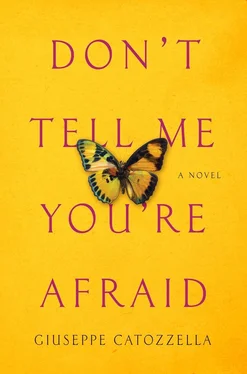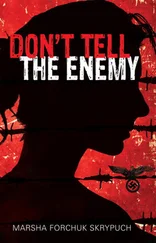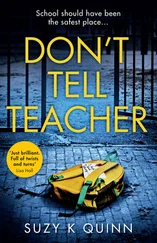I had all the time in the world, plus I had to loosen up my joints after all those hours with my knees bent, not being able to straighten them.
The city at peace seemed like a miracle to me. Being able to go around without a burka, being able to walk or even shout in the middle of the street. Being able to stop someone and talk to him. The idea of being able to do all those things made my head spin.
After an hour I reached the stadium; it was now eight o’clock. The guard behind the gate was moved to take pity on me. When he heard where I’d traveled from, he opened the gate with a big key, let me in, and even found me a shady spot where I could rest.
I tried to lie down on the grass surrounding the track, in front of the stands, but sleep was the last thing on my mind.
I was quivering like the strings of a shareero, the instrument that Hussein played in Hodan’s group.
At ten they opened the gates and the first runners arrived with their coaches. Only then, unhurriedly, did they set up the tables for those who had signed up.
I was the first to present myself.
The lady in charge looked at me questioningly and asked me my name. I answered her, terrified that somehow, between Mogadishu and Hargeysa, my name might have been lost along with my registration and that I had come all that way for nothing.
But the lady looked me up and down and only asked: “Did you sleep, child?”
“Yes, of course I slept. How could I run if I hadn’t rested, abaayo ?” I replied, candid as a lily.
“All right, then go rinse your face afterward. There’s a fountain over there.”
“Thank you, abaayo .”
“What’s your name, child?”
“Samia Yusuf Omar,” I said, all in one breath.
The lady opened the register and searched. Endless seconds went by. “I come from Mogadishu, abaayo ,” I added.
“Samia Yusuf Omar from Mogadishu… Here it is.”
I signed the book and she gave me the bib with my number. My first bib.
I was signed up for the women’s one-hundred-meter and two-hundred-meter races.
My number was 78.
I had to wait another two hours before running. I didn’t know what to do with myself.
Fortunately, the women competed before the men.
I exchanged a few words with a couple of girls, but I couldn’t get too distracted. I was there to win, not to chat. I kept looking around; I couldn’t help it. Everything was new to me. It was my first time in the north, my first real race.
I was surely the youngest. No one would have bet a shilling on me.
After a while, when my impatience had reached its peak, I took the path of least resistance. I lay down on the grass and waited for time to pass. Surrounded by that sweet, enveloping scent.
Until the moment came.
My opponents didn’t seem very intimidating. They were older than me, but they didn’t have the fervent eyes of real athletes. Right away I had the feeling that I could come in first.
In a little less than two hours I won the two qualifying rounds in the heats, one after the other.
Before I knew it, I found myself in the final, with a lot less breath, a great deal of pain in my quadriceps, and two races behind me. One in the hundred meters and one in the two hundred.
The first-place finishers from each heat were admitted to the final.
The first of the finals was the two hundred meters. My legs were stiff as boards from the overexertion; I was twice as exhausted as the others because I was the only one to run both races.
But that only made me more driven. If I had come this far, I might even win.
I bent over the starting blocks and at the signal took off like a rocket, my eyes only on the finish line.
In my head, as always, were the voices of Aabe and Alì, shouting at me to run.
And I ran.
I crossed the finish line first.
It was a huge thrill, the greatest feeling of liberation.
Number one.
I was the fastest runner of my country in the two hundred meters. Something that I was barely able to absorb.
I didn’t have much time to let it sink in, however. In ten minutes the hundred-meter final, the most important race, would be run.
The spectators in the stands began to make themselves heard for the first time. Some shouted, cheering us on.
As we headed for the starting blocks, the girl in the lane next to mine pointed to a small group of people in the stands who were trying to get my attention. When I looked over, they began clapping and rooting for me. I had fans.
I raised my arm and waved at them.
When the starting gun went off, I again heard only the voices of Aabe and Alì in my head. Run, little warrior. Run and smile at the finish line!
I burned those hundred meters like I’d never done before.
The girls to my right and to my left were slower than I was; instantly I was two steps ahead of them. Out of the corner of my eye I saw that there was only one runner, in the first lane, who was even with me. In the last ten meters I poured out everything that had brought me to that track.
The strain and effort, the training, the commitment, the fears and frustrations that I’d experienced for at least seven years. I looked back at Mogadishu like a cage from which I had finally been able to escape and run free.
And I won. Again.
When I reached the finish, I felt like a cricket that for weeks has been prevented from jumping, caught and kept in a box, as kids do in Mogadishu. They keep it in their pocket; then, after days, they release it, and the cricket jumps a long distance. They have jumping contests for crickets that have been penned up, and they bet on them. I felt like one of those confined crickets. I kept jumping left and right; I could have reached the sky. And the beauty of it was that we were in Hargeysa, there was no war, there were no Al-Shabaab men.
Here, at last, I could jump and celebrate in peace.
And I could smile too.
I smiled at everyone and I shook hands with those who came up to meet me. If Alì had seen me, he would have been so happy he’d have cried like a little girl. I hadn’t seen him in six months, and in my heart I dedicated the victory to him, to my coach. To the one who had made me become an athlete. And who was my best friend.
That day was the first time I saw my official times, posted in large letters on an electronic scoreboard: 15.83 for the hundred meter, and 32.77 for the two hundred.
There was still a lot of room for improvement, but I had won. I was the fastest woman in my country.
And I had earned the right to run in the race to be held in Djibouti three months from now. My first international competition.
On the trip back I slept for twenty hours straight. We left in the evening and would not arrive until the following evening. I never opened my eyes, not even once; I didn’t even get out of the bus to go to the bathroom.
I had my two medals around my neck, safely tucked under my T-shirt, where I still wore the bib with 78, my lucky number.
Only for the first hour did I feel like a bomb about to explode. An elderly lady sitting beside me was trying to read a book by the dim light that filtered through the window, and I felt the irresistible urge to tell her everything that had happened to me, minute by minute. Every so often I tried to start a conversation. There was no way; she never raised her eyes from those pages.
Afterward I began to crumble. I hadn’t slept in two days and I plunged into a deep, deep sleep. I fell asleep with my hand over the medals, grasping the jacket of my tracksuit.
At the bus station in Mogadishu, everything was the same as I had left it. For me centuries had passed; I had traveled to the other side of the world and had become someone else. Yet in a flash I found myself back where I’d started, as if nothing had happened: the usual troubled faces, sunken and anxious, the usual rifles over the shoulders, the usual stained, crumpled uniforms, salvaged from who knows where.
Читать дальше




![Ally Carter - [Gallagher Girls 01] I'd Tell You I Love You But Then I'd Have to Kill You](/books/262179/ally-carter-gallagher-girls-01-i-d-tell-you-i-lo-thumb.webp)







